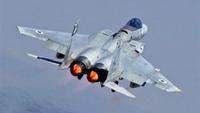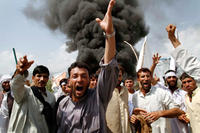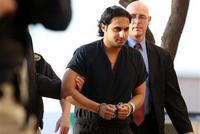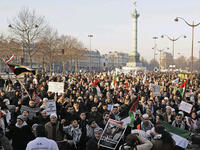-
Hamas operative killed in Sudan successor of operative assassinated in Dubai
One of the victims of the Israeli strike on two Hamas operatives in Sudan was the successor to the Hamas operatives killed by Israeli agents in Dubai last year; both operatives were in charge of the Iranian-Hamas arms smuggling connection; information emerged that Israel was particularly keen to disrupt the Iranian-Hamas connection after learning that the anti-Gaddafi rebels sold Iran hundreds of nerve and mustard gas munitions from abandoned Libyan military bases; Iran bought the munitions on behalf of Hamas and Hezbollah
-
-
Lawmakers question handling of Awlaki case

An investigation by Fox News Unit revealed that the commission investigating the 9/11 attacks was likely never told by the FBI about an arrest warrant filed and then dropped against American-born radical Muslim cleric Anwar al-Awlaki — the spiritual guide to at least two of the hijackers
-
-
Israeli strikes kill WMD-related Hamas operatives in Sudanese port

Sudan accused Israel of killing two men in the port city of Port Sudan; Israel declined to comment on the accusations; sources say the target was the Hamas representative in Sudan in charge of the vast Iranian weapons smuggling enterprise for the Gaza Strip via Egypt; it appears Israel acted after information emerged that Iran purchased a large quantity of chemical munitions from anti-Gaddafi rebels; the rebels found the WMDs in Libyan military bases abandoned by the Libyan military; Iran was making arrangements to have the munitions delivered to Hamas and Hezbollah to be used against Israel; Israel’s action is reminiscent of the January 2009 attack on a convoy of arms smugglers in Sudan, near the Egyptian border; the strike, which killed 119 people, was aimed to prevent an Iranian weapons shipment from reaching Hamas; in the past two years Israeli aircraft and naval units have been operating against smuggling ships in the Gulf of Aden and the Red Sea; the ships carry Iranian arms to Hamas
-
-
Wastewater employee charged with terrorism after idling plant

A 43-year old waste water facility employee was the sole employee during the night shift at the massive Greenfield Water Reclamation Plant in Gilbert, Arizona; last Friday night, armed with a hand gun, the employee walked through the facility alone, methodically turning off major operating systems at the plant; left untreated, the sewage in the system would cause a buildup of methane gas, which could cause a huge explosion; after a 2-hour stand-off, the police arrested the man, allowing other employees to turn on the treatment systems; the employee is being held on a $250,000 bond, charged with terrorism
-
-
U.S. lawmakers condemn Koran burning, violent reaction

As angry protests spread in Afghanistan in response to a Florida pastor burning a Koran — a UN building was attacked, with twenty killed and more than eighty wounded — and with experts worried that anger will spread throughout the Muslim world, U.S. lawmakers of both parties are condemning the burning of a Koran by a radical American Christian pastor; Republican Senator Lindsey Graham of South Carolina says that with rights come responsibilities in a free society; “I wish we could find some way to hold people accountable. Free speech is a great idea, but we are in a war. During World War II, you had limits on what you could say if it would inspire the enemy. So, burning the Koran is a terrible thing, but it doesn’t justify killing someone. Burning a Bible would be a terrible thing, but it doesn’t justify murder”
-
-
"An act of extreme intolerance and bigotry"
Florida pastor Terry Jones made good on his threat to burn a Koran; the backlash has begun: in Afghanistan, demonstrators attacked a UN building, killing twenty and wounding eighty-three; among the dead are Norwegian, Romanian, Swedish, and Nepalese nationals; experts worry that the wave of protest will sweep the Muslim world; last year, Obama, Clinton, Gates, Petraeus, Muller and others warned of the pernicious consequences burning the Koran would have; they were criticized in some quarters for having a “chilling effect” on free speech — but they were right; fighting for the hearts and minds of more than a billion Muslims is difficult enough without Jones’s reckless and narcissistic action
-
-
Kentucky releases homeland security terrorist reporting app

Kentucky’s Office of Homeland Security (KOHS) recently released an iPhone app designed to allow people to anonymously report any suspicious activity they see; the app, called, Eyes and Ears on Kentucky, captures tips in real-time and is capable of providing additional information using the iPhone’s camera and GPS features; the app comes as part of the broader national DHS “See Something Say Something” campaign which will gather tips from across the nation and allow local, state, and federal law enforcement officials to sift through reports of any suspicious activity
-
-
Congress hears U.S. "failing" to confront radical Islam

Witnesses at a high-profile congressional hearing on Islamic radicalization said Thursday that America is “failing” to confront the threat posed by homegrown extremism, as lawmakers for hours traded accusations over whether the inquiry unfairly singled out Muslims; the hearing, one of the most controversial in recent memory, featured congressmen, a California sheriff, a Muslim scholar, and witnesses whose relatives had been recruited by radicals; Representative Peter King (R-New York), chairman of the House Homeland Security Committee, vowed to press ahead with more hearings, telling reporters late Thursday that the next panel would probably focus on Islamic radicalization in the U.S. prison system
-
-
On bangs and whimpers
Yesterday was the first day of the congressional hearings on Islamic radicalization in America; it is already clear that the hearings will not become important and memorable like the Army-McCarthy Hearings of the early 1950s, the Fulbright hearings of the late 1960s, or the Church Hearings of the mid-1970s; in today’s political climate, nothing can bring a conversation to an end more quickly than accusing a public figure of engaging in stereotyping ethnic or religious minorities, of ethnic profiling and scapegoating — whether or not such accusations have any merit; the Democrats on the committee went on the offensive, painting the hearings as illegitimate and making the hearings themselves the focus of attention and debate; the tone and body language of many of the Republicans on the committee showed that they grasped that this was a no-winner for them; yes, they denied charges by Democrats that this was a case of witch hunting and stereotyping, but they acted as if they were simply hoping to ride out the hearings without doing anything too disastrous
-
-
A new threat: organized crime, terrorists links
Lawmakers and security analysts around the world are growing increasingly worried about links between terrorists and organized crime; terrorists and organized crime gangs have increasingly worked together around the world to finance operations; in 2000, it was estimated that FARC, Colombia’s largest terrorist organization, received as much as $400 million annually from its role in the drug trade; intelligence reports found that al Qaeda was looking to work with Mexican cartels to sneak into the United States; Islamic extremists have also become organized criminal networks themselves engaging in kidnapping, human trafficking, counterfeiting money, fraud, and armed robbery to raise money for their causes
-
-
Bill to protect anti-terror tipsters from discrimination suits

Three U.S. lawmakers from both sides of the aisle on Tuesday joined a growing campaign to expand protections for Americans who tip off law enforcement to potential terrorist threats from discrimination lawsuits if they identify the wrong person; their legislation is just the latest effort to win protections for tipsters of suspicious terror activities; the current U.S. legal system deters some Americans from tipping off authorities; a group of US Airways passengers were sued in 2006 after reporting six Islamic clerics who requested seat changes and asked for seat belt extenders that she said could have been used as weapons; “We cannot afford to let those who help prevent terror attacks become the targets of senseless liability suits,” said one of the sponsors
-
-
ME turmoil offers both problems and hope for U.S. counterterrorism efforts

In a few short weeks, popular uprisings in the Islamic world have upended counterterrorism relationships that the United States spent much of the past decade trying to build; the turmoil is a source of concern for U.S. counterterrorism officials, scrambling partnerships that have been critical to operations against al Qaeda; U.S. officials say, though, that the long-term prospect of democratic reform in the region will likely be a setback to the terrorist group, because the uprisings — and the prospect that more democratic and representative governments could emerge — will do significant damage to al Qaeda’s appeal
-
-
House hearings on Islamic radicalization to open Thursday

Representative Peter King (R-New York), chairman of the House Homeland Security Committee, will on Thursday open hearings on Islamic radicalization in the United States; “I’m not going to give into political correctness. I’m going ahead,” King said; he plans to call several witnesses, including the uncle of a Minneapolis man who linked up with a terror group in Somalia and is believed to have been killed; he also plans to call the father of a man alleged to have killed a soldier at an Arkansas military recruiting center in 2009; the hearing has generated much debate and publicity, and the U.S. largest Muslim advocacy group and other organizations are stoking opposition to a hearing
-
-
"Somethings" may be clogging counterterrorism efforts

Initiatives by DHS to encourage sports fans, shoppers, and public transportation users to “Say Something” if they notice suspicious activity may be overwhelming the system and hindering our defenses, according to a policy analyst; the recent partnership between DHS and the NBA shows DHS does not plan on holding back its call for vigilance
-
-
Most-wanted terrorist lists missing most wanted
Anwar Awlaki, the Yemen-based American Imam inciting Muslims to attack America, has been described by U.S. security officials as “terrorist number one” and as “the most significant risk to the U.S. homeland”; he is the first U.S. citizen ever placed on the CIA targeted killing list; yet, Awlaki remains inconspicuously omitted from federal most-wanted lists — and in January 2010, customs agents had Awlaki in custody at JFK International Airport in New York on an arrest warrant for passport fraud; according to classified immigration records, JFK agents were advised to release the detainee because the warrant had mysteriously “been pulled back” the day before; inquiring minds want to know what gives
-
More headlines
The long view
What Does Netflix’s Drama “Adolescence” Tell Us About Incels and the Manosphere?
While Netflix’s psychological crime drama ‘Adolescence’ is a work of fiction, its themes offer insight into the very real and troubling rise of the incel and manosphere culture online.
